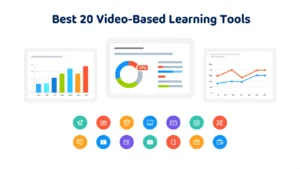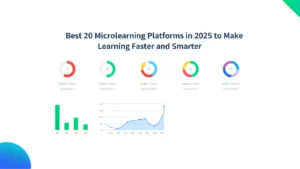If you’re running corporate training, managing online courses, or onboarding new employees, you already know the challenge: traditional methods waste time and don’t scale. That’s why Learning Management Systems (LMS) have become the backbone of modern training in 2025.
With the global eLearning market projected to hit $460 billion by 2026 (Global Market Insights), organizations of all sizes—from startups to universities—are investing in LMS platforms to cut costs and deliver consistent training. According to LinkedIn’s Workplace Learning Report, 94% of employees say they’d stay longer at a company that invests in their learning.
We tested and researched dozens of systems, comparing features, pricing, scalability, and user experience. This list of the top 20 LMS platforms is designed for HR managers, corporate trainers, universities, agencies, and eLearning entrepreneurs who need the right technology to grow without bottlenecks.
What is a Learning Management System (LMS)?
A Learning Management System (LMS) is software that lets organizations deliver, track, and manage training programs. Whether it’s onboarding new employees, upskilling teams, or selling online courses, an LMS acts as the central hub for learning.
Here’s why it matters in 2025:
- Scalability: Train 10 or 10,000 employees with the same consistency.
- Cost Efficiency: Replace in-person sessions with digital learning.
- Data Tracking: Measure learner progress with analytics and compliance reports.
- Customization: Tailor training to specific departments or clients.
- Engagement: Keep employees and students motivated with gamification and interactive learning.
Quick Comparison of Best LMS Platforms in 2025
When choosing an LMS, decision-makers usually care about ease of use, pricing, scalability, mobile compatibility, and support. We’ve included all these in the table below to help you compare at a glance.
| LMS Platform | Best For | Starting Price | Free Trial? | Key Feature | G2 Rating | Mobile App |
| TalentLMS | SMBs & Startups | $69/mo | Yes | Gamification | 4.6 | Yes |
| Docebo | Enterprises | Custom | Yes | AI-powered learning | 4.7 | Yes |
| LearnUpon | Corporates | $999/mo | Yes | Multi-portal | 4.6 | Yes |
| Absorb LMS | Enterprises | Custom | Yes | Reporting | 4.5 | Yes |
| Moodle | Universities | Free / Open Source | N/A | Open source | 4.2 | Yes |
| Blackboard | Higher Ed | Custom | No | Virtual classroom | 4.0 | Yes |
| SAP Litmos | Global Teams | $6/user/mo | Yes | Integrations | 4.2 | Yes |
| Cornerstone | Enterprises | Custom | No | Compliance training | 4.3 | Yes |
| 360Learning | Collaborative Learning | $8/user/mo | Yes | Peer learning | 4.7 | Yes |
| LearnWorlds | Course Creators | $29/mo | Yes | White-labeling | 4.7 | Yes |
| Teachable | Individual Creators | $39/mo | Yes | Sales features | 4.6 | Yes |
| Thinkific | Course Creators | $49/mo | Yes | Drag-and-drop | 4.7 | Yes |
| Kajabi | Coaches & Entrepreneurs | $149/mo | Yes | Marketing suite | 4.5 | Yes |
| iSpring Learn | Corporate Training | $2.99/user/mo | Yes | SCORM support | 4.6 | Yes |
| EdApp | Mobile Learning | Free / Paid | Yes | Microlearning | 4.7 | Yes |
| Canvas | Schools & Universities | Custom | No | Student-centric | 4.4 | Yes |
| DoMyLMS | SMBs | $50/mo | Yes | Easy setup | 4.3 | Yes |
| SkyPrep | Employee Training | $199/mo | Yes | Reporting tools | 4.5 | Yes |
| LearnDash | WordPress Users | $199/year | No | LMS plugin | 4.6 | Yes |
| Tovuti LMS | All-in-One | $775/mo | Yes | Interactive tools | 4.7 | Yes |
Best Learning Management Systems in 2025
Here’s the deep dive into each platform.
1. TalentLMS – “Simple, Scalable Training for Teams”
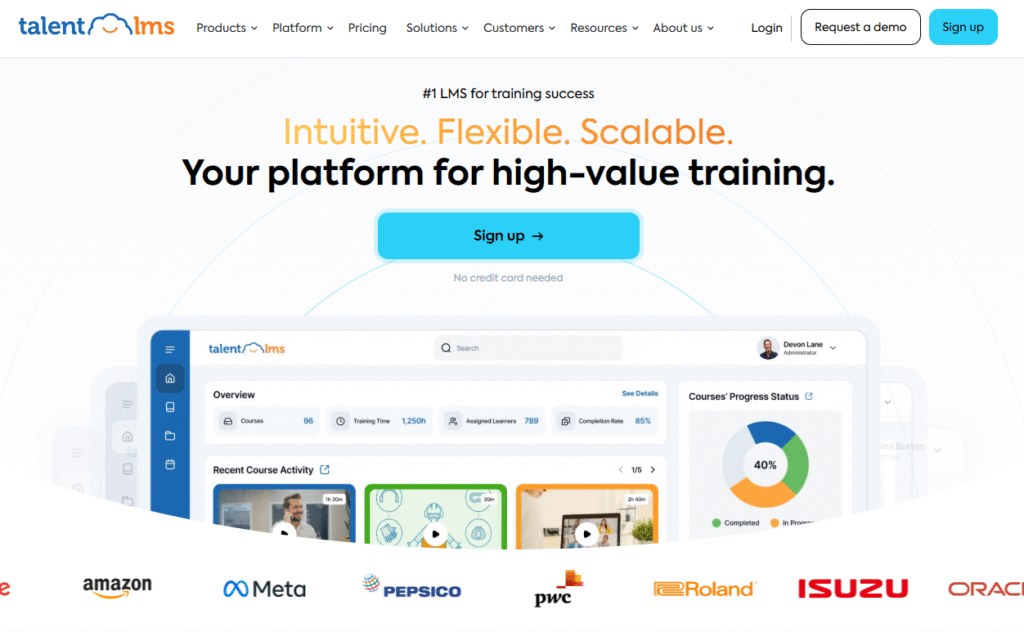
TalentLMS is one of the most popular cloud-based Learning Management Systems in 2025. Designed for small to medium-sized businesses, it helps teams onboard new employees, roll out compliance training, and build engaging learning paths without complexity. With over 70,000 organizations worldwide relying on it, TalentLMS strikes the balance between affordability, scalability, and ease of use.
Key Features
Gamification & Engagement
TalentLMS integrates leaderboards, points, and badges into its training experience. This motivates learners to complete courses faster while creating a healthy sense of competition within teams.
Custom Course Builder
The drag-and-drop course builder makes it simple to design interactive modules. You can embed videos, quizzes, and SCORM content, making training both structured and engaging.
Multi-Tenant Setup
Companies with multiple departments or clients can create separate learning portals. Each portal can be branded and customized while keeping administration centralized.
Mobile-Ready Training
TalentLMS has a dedicated mobile app, letting employees complete courses anytime. This is especially useful for frontline staff or remote workers.
Reporting & Analytics
Detailed reports let HR managers and training coordinators track learner progress, completion rates, and compliance metrics. Data can also be exported for auditing.
Pros & Cons
| Pros | Cons |
| Affordable pricing for SMBs | Limited advanced analytics |
| Gamification boosts engagement | Customization can be restrictive |
| Easy-to-use interface | Not as powerful for enterprise |
| Supports SCORM & xAPI | Branding options limited on lower tiers |
Pricing
- Starter Plan: $69/month (up to 40 users)
- Plus Plan: $149/month (up to 100 users)
- Premium Plan: $279/month (up to 500 users)
Custom enterprise pricing available.
Best For Small & Medium Businesses Running Scalable Training
TalentLMS is perfect for growing businesses that need affordable yet effective training.
- HR managers — who want quick onboarding solutions
- SMBs — looking for cost-effective compliance training
- Remote-first companies — ensuring consistent training across locations
- Agencies — delivering branded training to clients
TalentLMS is best if you want an easy-to-implement LMS without the complexity of enterprise-level platforms. A hidden gem: use the multi-tenant feature to set up client-specific training academies under one account.
How to Use TalentLMS for Employee Onboarding
Set up role-specific courses (e.g., sales training, compliance, customer support) so that new hires hit the ground running within their first week. Add quizzes to verify understanding and automate reminders to keep learners on track.
Best Alternate: iSpring Learn
If you need deeper SCORM support and advanced reporting at a similar price range, iSpring Learn is a strong TalentLMS alternative.
2. Docebo – “AI-Powered Corporate Learning”
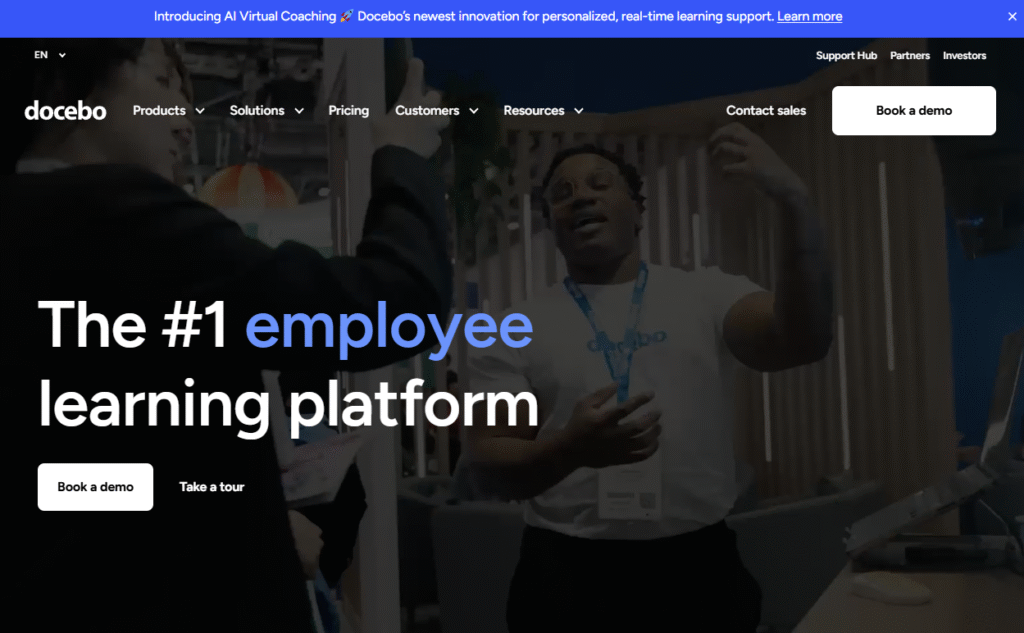
Docebo is a leading enterprise-grade Learning Management System built for global corporations. Trusted by brands like Amazon, Walmart, and Heineken, it focuses on delivering scalable, personalized learning experiences. What sets Docebo apart is its AI-driven recommendation engine, which helps employees access relevant training content at the right time.
Key Features
AI-Powered Learning Paths
Docebo uses machine learning to analyze user behavior and suggest tailored courses. This reduces time spent searching for content and ensures learners get exactly what they need.
Multi-Portal & Multi-Language Support
Perfect for multinational companies, Docebo lets you create multiple branded learning environments with built-in translation for global rollouts.
Extended Enterprise Training
Companies can use Docebo not just for employees but also for customers, partners, and distributors, making it an all-in-one learning ecosystem.
Content Marketplace Integration
Docebo connects with third-party learning libraries like LinkedIn Learning, Coursera, and Udemy Business, so organizations can expand training without building everything in-house.
Advanced Reporting & Compliance
Track certifications, compliance deadlines, and learner performance with enterprise-grade analytics that integrate with HR systems.
Pros & Cons
| Pros | Cons |
| AI-driven personalization | High learning curve |
| Multi-language support | Expensive for SMBs |
| Integrates with top content providers | Overwhelming for small teams |
| Extended enterprise features | Custom pricing only |
Pricing
- Enterprise Plan: Custom pricing (depends on users and features)
- Free trial available upon request.
Best For Large Enterprises With Global Workforces
Docebo is the go-to LMS for multinational corporations that require scalable learning ecosystems.
- Enterprises — needing AI-driven training personalization
- Global HR teams — managing multi-language, multi-country training
- Partner networks — extending training to distributors and clients
- Compliance-heavy industries — finance, healthcare, manufacturing
Docebo shines where scale and personalization matter most. A pro tip: integrate Docebo with LinkedIn Learning to create a blended content strategy that mixes in-house training with professional development courses.
How to Use Docebo for Compliance Training
Set compliance rules, certification deadlines, and automated reminders. Docebo’s reporting makes it easy to prove compliance during audits, reducing risk in industries with strict regulations.
Best Alternate: Cornerstone OnDemand
If your enterprise prioritizes compliance tracking and employee performance management over AI personalization, Cornerstone OnDemand is a strong competitor to Docebo.
3. LearnUpon – “Corporate Training at Scale”
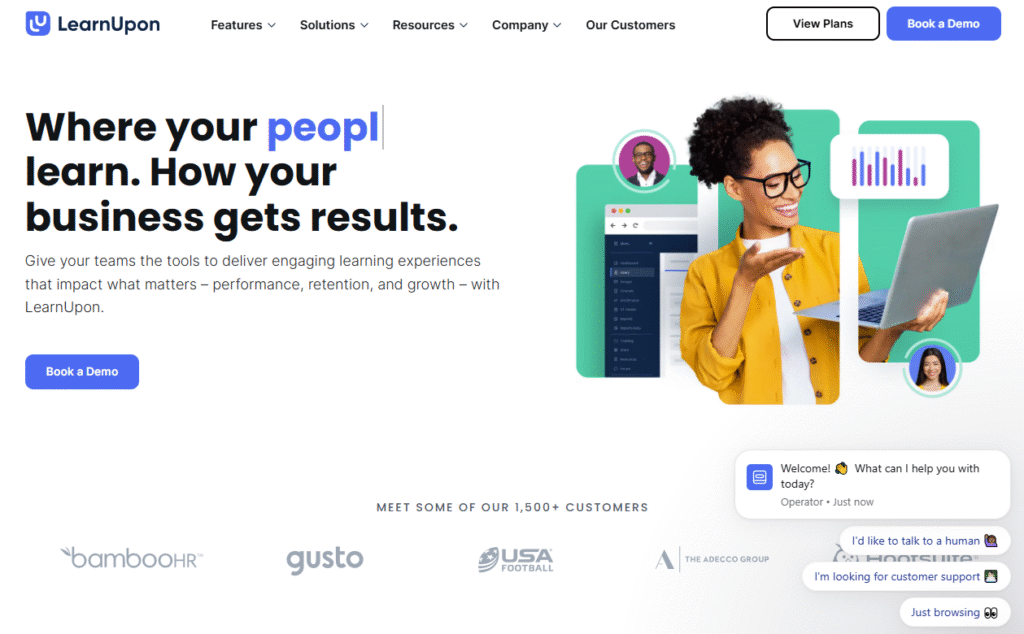
LearnUpon is designed specifically for corporate training and customer education. With a reputation for reliability and ease of use, it’s trusted by Zendesk, DocuSign, and Logitech to train employees, partners, and clients. Its strength lies in handling multiple audiences from one platform, making it ideal for companies that need a centralized yet segmented training solution.
Key Features
Multi-Portal Management
LearnUpon allows organizations to run multiple branded portals from a single account. Each audience—employees, customers, or partners—can have its own learning environment without additional overhead.
Powerful Integrations
Seamlessly integrates with Salesforce, Zoom, Slack, and HRIS systems to streamline training administration and learner engagement.
User-Friendly Interface
Despite its enterprise-level capabilities, LearnUpon is intuitive and requires minimal training for admins or learners.
SCORM & xAPI Support
Supports industry standards, enabling organizations to upload existing training materials without rebuilding courses.
Dedicated Customer Success
Each account comes with a dedicated support manager, ensuring smooth implementation and ongoing optimization.
Pros & Cons
| Pros | Cons |
| Handles multiple audiences well | High pricing compared to SMB tools |
| Enterprise integrations | Requires upfront onboarding time |
| Excellent customer support | Limited customization for small teams |
| Strong reporting & analytics | Best suited for corporates, not freelancers |
Pricing
- Basic Plan: $999/month (up to 300 users)
- Premium Plan: Custom pricing for larger enterprises
Free trial available.
Best For Corporations Training Multiple Audiences
LearnUpon is the right LMS for companies that train more than just employees.
- Corporates — needing multi-audience training portals
- Customer success teams — building education academies for clients
- Partner networks — providing scalable training to distributors
- Enterprise HR teams — integrating training into daily workflows
LearnUpon is perfect for enterprises that want a single system to train employees, customers, and partners without juggling multiple LMS platforms. Pro tip: use Salesforce integration to deliver training directly inside your CRM.
How to Use LearnUpon for Customer Education
Set up a customer learning portal where clients can access onboarding, feature tutorials, and certifications. This reduces support tickets and increases product adoption.
Best Alternate: Absorb LMS
If you need similar multi-audience capabilities but want stronger analytics and custom reporting, Absorb LMS is a worthy alternative to LearnUpon.
4. Absorb LMS – “Flexible Learning for Modern Enterprises”
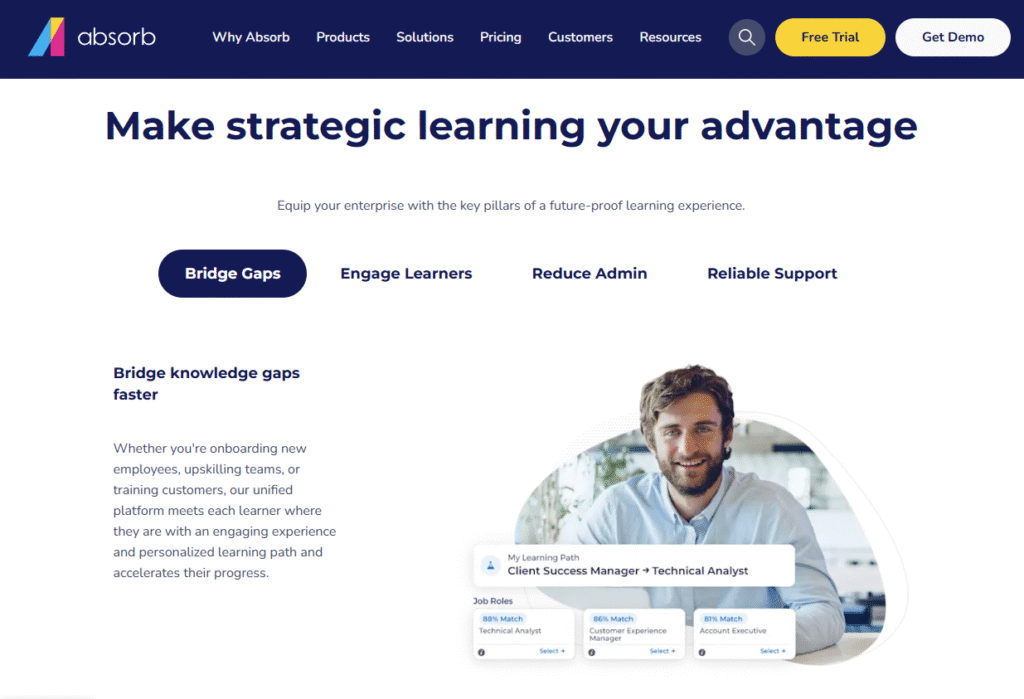
Absorb LMS is a feature-rich enterprise learning management system built for organizations that value flexibility, analytics, and integration. Trusted by Sony, Johnson & Johnson, and Airbnb, it’s widely recognized for its clean interface and strong reporting tools. Absorb is especially effective for companies that want a blend of employee training, partner education, and customer-facing learning programs in one ecosystem.
Key Features
Intuitive Admin Dashboard
Absorb’s admin interface makes it easy to manage large numbers of learners, assign courses, and monitor progress without overwhelming training managers.
AI-Powered Reporting & Analytics
Absorb Insights provides deep analytics on learner engagement, compliance, and ROI. Admins can build custom dashboards to surface the most important metrics.
Custom Branding & Learner Portals
Organizations can fully brand their LMS portals, making the experience feel like an extension of their company rather than a third-party platform.
Mobile-First Experience
Absorb has a responsive design and mobile app, allowing learners to access training anytime and anywhere.
eCommerce Features
For companies selling training externally, Absorb offers course monetization with eCommerce, payment gateways, and discount codes.
Pros & Cons
| Pros | Cons |
| Powerful reporting tools | Higher price point |
| Strong eCommerce features | Limited gamification |
| Clean, modern interface | Can be overwhelming for small teams |
| Flexible branding options | Setup requires time investment |
Pricing
- Standard Plan: Custom pricing based on user count and features
- Free trial available upon request
Best For Enterprises Needing Flexibility & Deep Analytics
Absorb LMS is ideal for large organizations that need scalable learning with strong insights.
- Enterprises — requiring flexible analytics dashboards
- Companies monetizing courses — offering external training at scale
- HR teams — needing compliance reporting and certifications
- Corporate academies — creating branded portals for training
Absorb LMS is best suited for organizations that see training as both an internal performance driver and an external revenue stream. Pro tip: use Absorb’s eCommerce module to launch a revenue-generating online academy without third-party plugins.
How to Use Absorb LMS for Compliance Training
Set automated rules for certification expiry, send reminders before deadlines, and create compliance reports for audits—ideal for industries like finance and healthcare.
Best Alternate: LearnUpon
If your priority is multi-audience training with simpler pricing tiers, LearnUpon is a solid alternative to Absorb LMS.
5. Moodle – “Open-Source Learning for Education & Beyond”
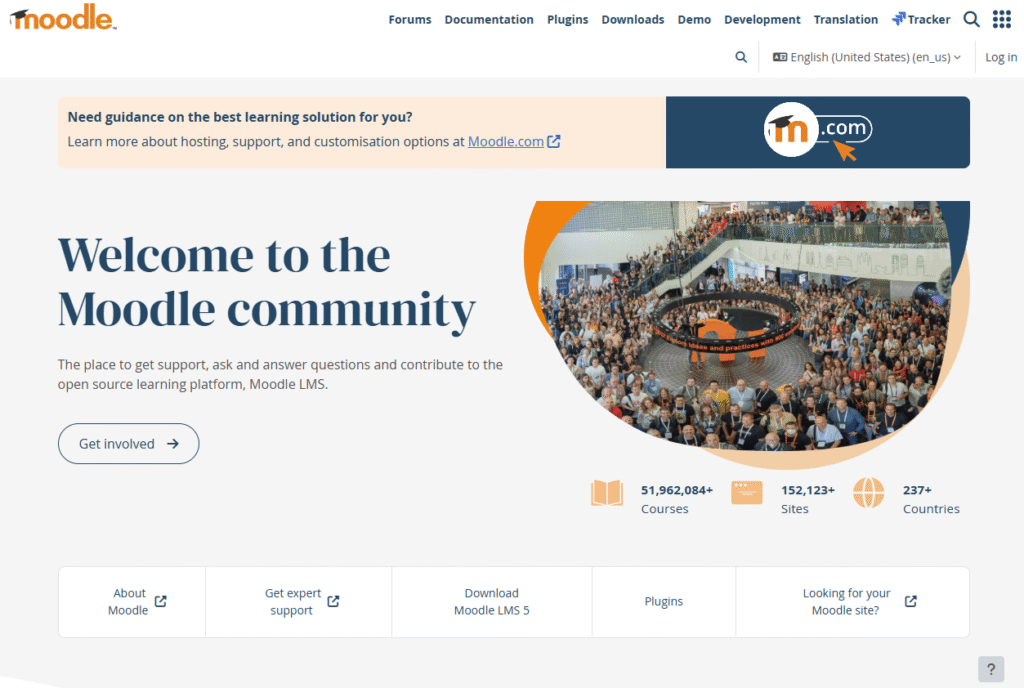
Moodle is the world’s most popular open-source Learning Management System, powering millions of learners across schools, universities, and organizations. Known for its flexibility, it has been adopted by institutions like The Open University and countless colleges worldwide. Unlike commercial LMS platforms, Moodle is free to use, though it requires technical expertise to host, customize, and manage effectively.
Key Features
Open-Source Flexibility
Moodle’s biggest advantage is its open-source framework, which allows institutions to fully customize features, integrate with existing systems, and adapt the platform to their unique needs.
Extensive Plugin Library
With thousands of community-built plugins, Moodle offers everything from gamification to attendance tracking, giving administrators the ability to expand functionality as needed.
Scalable for Large Institutions
Moodle can handle thousands of users simultaneously, making it suitable for universities and government training programs.
Mobile Learning App
The Moodle mobile app ensures learners can access courses, submit assignments, and communicate with instructors from anywhere.
Community Support
Backed by a large global community, Moodle offers forums, documentation, and development updates that keep the platform evolving.
Pros & Cons
| Pros | Cons |
| Free and open-source | Requires technical setup |
| Huge plugin ecosystem | Outdated UI without customization |
| Highly scalable | Limited customer support |
| Flexible customization | Maintenance can be resource-heavy |
Pricing
- Free (Self-Hosted): No licensing costs, only hosting fees
- MoodleCloud: Starts at $110/year for up to 50 users
- Paid hosting providers available for organizations needing managed services
Best For Schools, Universities & Institutions With IT Support
Moodle is best for educational institutions that have technical resources to manage an open-source system.
- Universities — running large-scale learning environments
- Schools — needing cost-effective LMS solutions
- Government agencies — requiring scalable, secure training
- Nonprofits — looking for a budget-friendly alternative
Moodle is the top choice if you want a customizable LMS without licensing fees. Pro tip: pair Moodle with a managed hosting service like MoodleCloud to avoid heavy server maintenance.
How to Use Moodle for Higher Education
Universities can set up Moodle portals with student dashboards, assignment submissions, and grading tools—making it a central hub for all academic activity.
Best Alternate: Canvas
If you want a ready-to-use LMS with a modern interface and don’t want to manage hosting, Canvas is a strong alternative to Moodle.
6. Blackboard – “Virtual Classrooms for Higher Education”
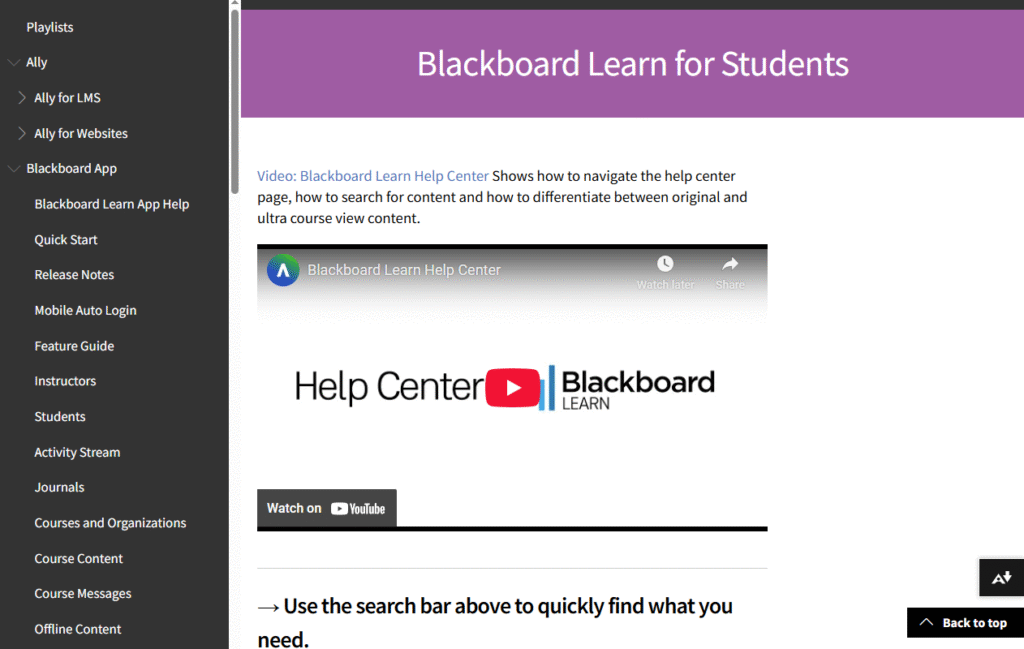
Blackboard has been a cornerstone in higher education learning management systems for decades. Used by institutions like University of Phoenix and Georgetown University, it remains a top choice for colleges, universities, and K-12 districts that need a platform for both online and blended learning. Its strength lies in its virtual classroom experience and academic-focused features.
Key Features
Virtual Classrooms & Collaboration
Blackboard integrates live video, chat, and interactive whiteboards, making it possible for instructors to replicate a classroom experience online.
Assessment & Grading Tools
Built-in testing, quizzes, and gradebook functions simplify how instructors create exams, grade students, and provide feedback.
Course Content Management
Professors can upload lecture notes, slides, and recorded sessions. Content can be organized by modules, weeks, or topics for structured learning.
Mobile App for Students
The Blackboard app allows learners to access coursework, receive notifications, and participate in discussions on the go.
Analytics & Performance Tracking
Administrators can track student performance, engagement, and retention, helping institutions improve outcomes.
Pros & Cons
| Pros | Cons |
| Strong focus on education | Interface feels outdated compared to competitors |
| Comprehensive grading tools | High implementation cost |
| Reliable virtual classroom features | Steeper learning curve for new users |
| Wide adoption in higher ed | Less flexible for corporate training |
Pricing
- Custom pricing depending on institution size and needs
- No free plan, but demos available
Best For Colleges, Universities & K-12 Districts
Blackboard is designed for academic institutions that want a full digital classroom experience.
- Universities — running large student populations
- Community colleges — offering hybrid learning options
- K-12 schools — providing structured online classes
- Distance learning programs — supporting online degrees
Blackboard is best if you want an all-in-one education-focused LMS with robust classroom tools. Pro tip: use Blackboard Collaborate to conduct live, interactive lectures with breakout rooms for group projects.
How to Use Blackboard for Remote Classes
Set up weekly lecture sessions with real-time video, upload reading materials, and create auto-graded quizzes. This ensures students stay on track whether they’re on campus or remote.
Best Alternate: Canvas
If your institution wants a modern, user-friendly interface with strong mobile support, Canvas is a solid Blackboard alternative.
7. SAP Litmos – “Agile Learning for Global Teams”
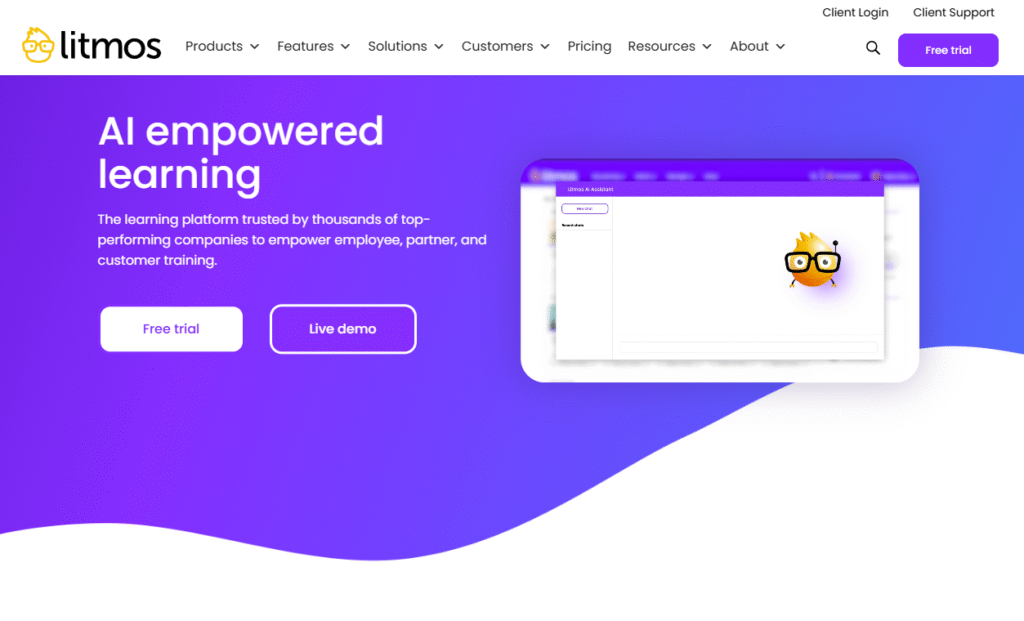
SAP Litmos is a cloud-based Learning Management System tailored for fast-growing companies and global enterprises. Used by organizations like PepsiCo, Mercedes-Benz, and ADP, it stands out for its extensive integrations, mobile-first training, and compliance management features. Its strength lies in delivering scalable training across multiple regions and industries.
Key Features
Integration-Friendly LMS
SAP Litmos integrates with Salesforce, Zendesk, Slack, and over 50 other applications. This makes it easy to embed training directly into business workflows.
Mobile-First Design
The Litmos mobile app ensures employees can complete training anywhere. Offline learning is also supported, allowing learners to download content and sync progress later.
Compliance & Certification Management
Built-in compliance features let organizations track certifications, automate renewal reminders, and generate audit-ready reports.
SCORM, xAPI & AICC Support
SAP Litmos supports multiple eLearning standards, making it compatible with a wide range of third-party content and authoring tools.
Content Library Access
The platform includes a vast catalog of ready-made training courses on compliance, leadership, and industry-specific skills.
Pros & Cons
| Pros | Cons |
| Strong enterprise integrations | Pricing on higher side |
| Great for compliance training | Limited customization for branding |
| Offline mobile learning | Reporting less flexible than some competitors |
| Pre-built content library | Overkill for small teams |
Pricing
- User-Based Pricing: Starts at $6/user/month
- Enterprise pricing available on request
- Free trial offered
Best For Global Enterprises Needing Compliance Training
SAP Litmos is ideal for companies that operate across multiple countries and need consistent, compliant training delivery.
- Large enterprises — scaling training across global offices
- Compliance-heavy industries — finance, pharma, healthcare
- Customer support teams — embedding training into Salesforce & Zendesk
- Remote-first organizations — offering mobile-friendly onboarding
SAP Litmos is a strong choice for multinational enterprises focused on compliance and integrations. Pro tip: leverage the pre-built course library to roll out mandatory compliance training instantly without creating content from scratch.
How to Use SAP Litmos for Compliance Training
Enable automated certification renewals and reminders. Pair with Litmos analytics to ensure auditors can access compliance proof in one click.
Best Alternate: Cornerstone OnDemand
If you need deeper compliance tracking with performance management features, Cornerstone OnDemand is a strong alternative to SAP Litmos.
8. Cornerstone OnDemand – “Enterprise Learning & Talent Management”
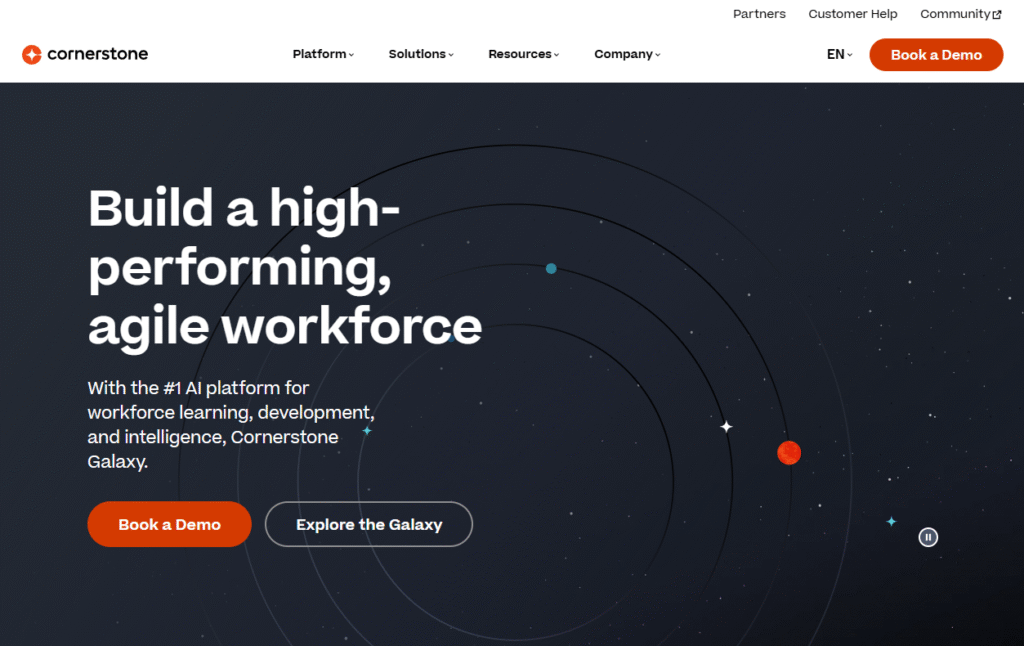
Cornerstone OnDemand is more than just an LMS—it’s a comprehensive talent management suite that combines learning, performance, and workforce development. Trusted by organizations like Nestlé, Walgreens, and Hulu, it is built for enterprises that need robust compliance training, employee development, and performance management in one system.
Key Features
Compliance Training & Certification
Cornerstone is widely used in heavily regulated industries. It tracks certifications, automates renewals, and provides audit-ready compliance reporting.
Performance & Talent Management
Beyond training, Cornerstone includes tools for performance reviews, skill assessments, and career development pathways, bridging HR and L&D.
Personalized Learning Paths
Employees can access curated learning journeys aligned with their career goals, ensuring training aligns with long-term workforce development.
Analytics & Reporting
Cornerstone provides advanced analytics that help HR teams identify skill gaps, measure training ROI, and forecast workforce needs.
Integrations & Marketplace
The platform integrates with HRIS systems like Workday and SAP SuccessFactors while offering a learning content marketplace with thousands of courses.
Pros & Cons
| Pros | Cons |
| Strong compliance & HR focus | Higher cost for enterprises |
| Combines LMS with HR tools | Complex setup process |
| Advanced workforce analytics | Requires admin training |
| Large content marketplace | Overwhelming for SMBs |
Pricing
- Enterprise Pricing: Custom quotes only
- No free plan, but demos available
Best For Large Enterprises Focused on Workforce Development
Cornerstone OnDemand is ideal for organizations that want to combine compliance training with long-term talent development.
- Enterprises — needing compliance + HR in one system
- HR leaders — aligning training with employee performance
- Heavily regulated industries — healthcare, finance, legal
- Global corporations — scaling training across regions
Cornerstone is best if you want an LMS that not only manages compliance but also develops employees into long-term leaders. Pro tip: use Cornerstone’s analytics to identify internal talent for promotions instead of hiring externally.
How to Use Cornerstone for Workforce Development
Build career pathways that connect learning modules with performance goals, ensuring employees see training as part of their professional growth.
Best Alternate: Docebo
If your priority is AI-driven personalized learning over HR and performance management features, Docebo is a strong alternative to Cornerstone.
9. 360Learning – “Collaborative Learning for Modern Teams”
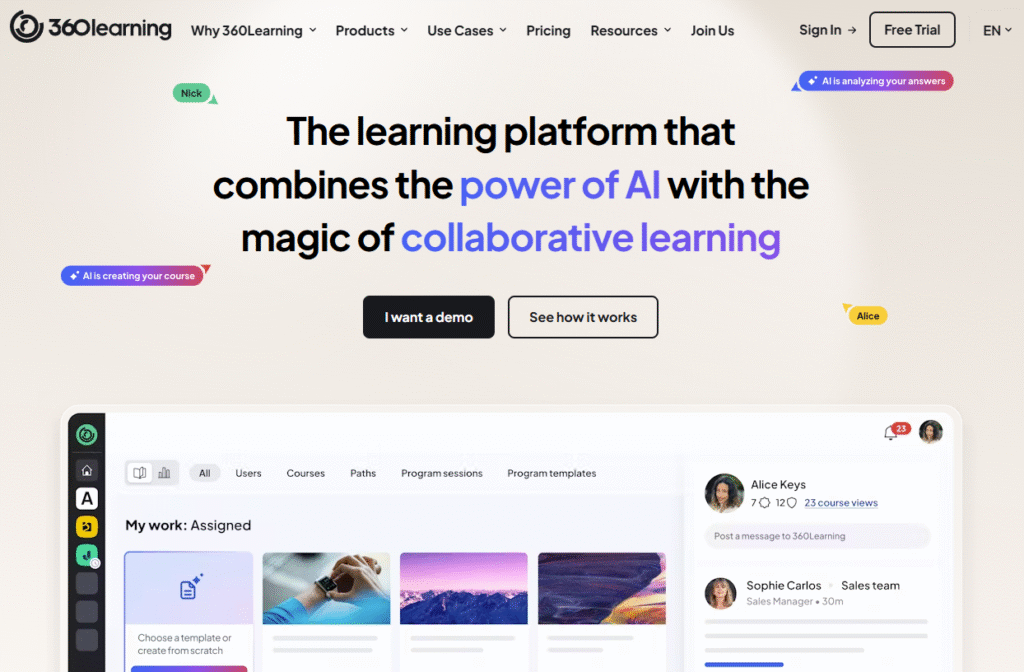
360Learning takes a collaborative approach to corporate training, making it one of the fastest-growing LMS platforms in 2025. Used by Toyota, LVMH, and Aircall, it shifts the focus from top-down training to peer-driven knowledge sharing. This makes it an excellent fit for organizations that value employee contributions in shaping learning content.
Key Features
Collaborative Course Creation
Employees can co-create training modules, turning subject matter experts into trainers. This reduces reliance on L&D teams alone.
Peer Learning & Feedback
Built-in tools allow learners to ask questions, leave comments, and share feedback, making training more interactive and engaging.
Rapid Course Deployment
Non-technical users can build and publish courses quickly, ideal for fast-moving industries where content must stay current.
Engagement Analytics
Managers can track course completion rates, learner engagement, and feedback loops to improve content relevance.
Integrations & Scalability
360Learning integrates with Salesforce, Slack, and Microsoft Teams, making it easy to roll training into daily workflows.
Pros & Cons
| Pros | Cons |
| Empowers peer-to-peer learning | Limited advanced reporting |
| Fast course creation | Not ideal for compliance-heavy industries |
| Highly engaging interface | Smaller content library than some competitors |
| Strong integrations | May require cultural shift in training approach |
Pricing
- Team Plan: Starts at $8/user/month
- Enterprise Pricing: Available on request
- Free trial offered
Best For Companies Encouraging Knowledge Sharing
360Learning is perfect for organizations that want collaborative learning instead of traditional top-down training.
- Fast-growing companies — needing rapid content creation
- Sales teams — sharing peer insights and product updates
- Startups & scale-ups — leveraging internal expertise
- Agile organizations — that value employee-driven training
360Learning is best if you want an LMS that turns employees into trainers and fosters a culture of shared knowledge. Pro tip: use the peer feedback tools to identify hidden subject matter experts in your organization.
How to Use 360Learning for Sales Enablement
Create quick, peer-generated training modules where sales reps share winning tactics, product updates, and recorded pitch examples. This keeps teams aligned and competitive.
Best Alternate: TalentLMS
If you want a more structured, gamified LMS without collaborative learning as the main focus, TalentLMS is a strong alternative to 360Learning.
10. LearnWorlds – “White-Label LMS for Course Creators”
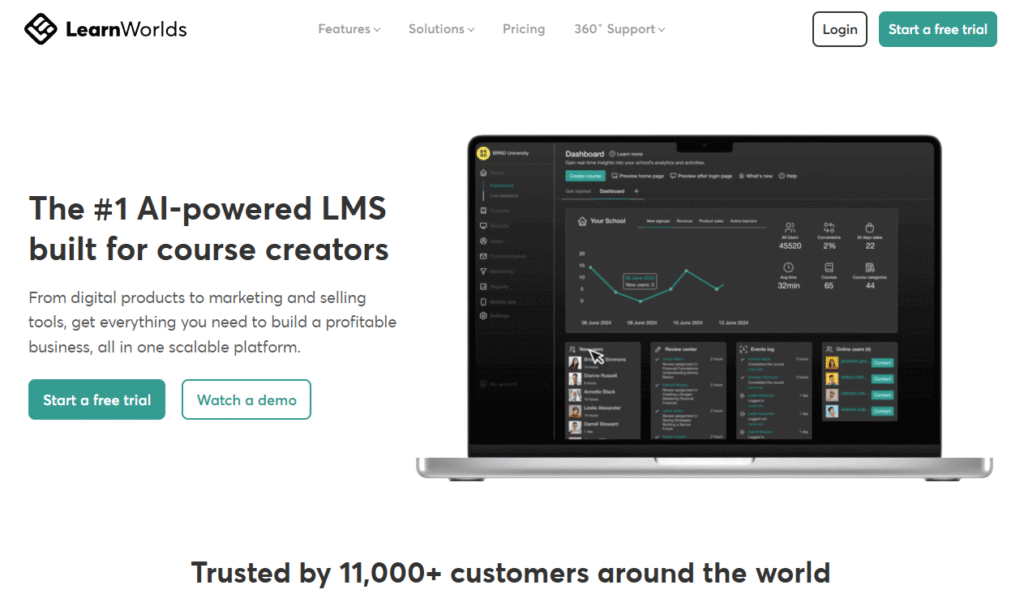
LearnWorlds is one of the top LMS platforms for entrepreneurs, educators, and businesses selling online courses. Trusted by Yale School of Management, UNICEF, and Publicis Groupe, it stands out for its white-labeling capabilities and interactive course design tools. Unlike corporate-focused LMS platforms, LearnWorlds is built to help course creators monetize their expertise.
Key Features
White-Label Branding
LearnWorlds allows creators to fully brand their LMS with custom domains, logos, and themes, making it appear as their own platform.
Interactive Video Learning
The platform includes advanced video features like quizzes, pop-ups, and note-taking directly inside videos, boosting learner engagement.
Built-In eCommerce Tools
Creators can sell courses with payment gateways, subscriptions, bundles, and discount codes—all within the LMS.
Mobile App Builder
LearnWorlds offers a branded mobile app option, allowing creators to deliver a consistent experience across devices.
Analytics & Reporting
Detailed analytics track learner progress, revenue, and sales performance, giving creators insights into both education and business growth.
Pros & Cons
| Pros | Cons |
| Fully white-label LMS | Pricing higher than Teachable/Thinkific |
| Interactive video tools | Steeper learning curve for beginners |
| Strong eCommerce support | Customer support slower on lower tiers |
| Mobile app option | Advanced features locked in higher plans |
Pricing
- Starter Plan: $29/month
- Pro Trainer: $99/month
- Learning Center: $299/month
- Free trial available
Best For Course Creators & Training Businesses
LearnWorlds is ideal for individuals and organizations looking to sell and scale online courses under their own brand.
- Educators — building interactive courses with video learning
- Coaches & consultants — monetizing expertise through training
- Agencies — offering client-branded academies
- Enterprises — creating revenue streams from training
LearnWorlds is a strong choice if you want a branded, interactive LMS built for monetization. Pro tip: use interactive videos to increase learner retention and course completion rates.
How to Use LearnWorlds for Online Course Business
Set up a branded learning portal with interactive videos, bundle premium courses, and upsell subscriptions to create a steady recurring revenue model.
Best Alternate: Thinkific
If you want a simpler course creation platform with a lower entry price, Thinkific is a popular alternative to LearnWorlds.
11. Teachable – “All-in-One Platform for Solo Course Creators”
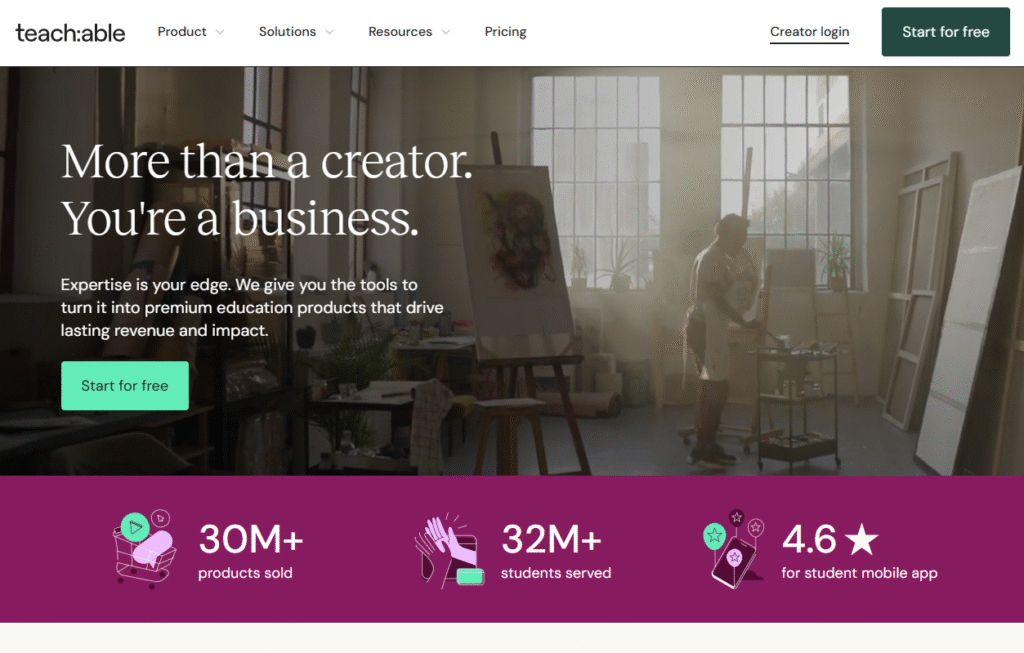
Teachable is one of the most widely used LMS platforms for individual creators, coaches, and small businesses. Known for its simplicity and strong course-selling tools, it powers over 100,000 instructors and has generated more than $1 billion in course sales. Teachable’s biggest appeal is how quickly creators can launch and monetize courses without technical skills.
Key Features
Drag-and-Drop Course Builder
Teachable makes it easy to build courses by uploading videos, PDFs, and quizzes. No coding or design skills are required.
Built-In Payment Gateway
With Teachable Payments, creators can accept credit cards, PayPal, and even Apple Pay. Payouts are handled automatically, simplifying course monetization.
Sales & Marketing Tools
Creators can upsell courses, offer bundles, and create coupons. Teachable also includes affiliate marketing features so you can recruit others to promote your courses.
Student Management
Instructors can track student progress, send automated emails, and issue certificates of completion.
Mobile Learning
Teachable’s responsive design ensures courses are mobile-friendly, giving students access anywhere.
Pros & Cons
| Pros | Cons |
| Easy for beginners | Limited design customization |
| Strong monetization tools | No advanced gamification |
| Built-in payment processing | Higher transaction fees on lower plans |
| Large user base & support | Lacks enterprise features |
Pricing
- Basic Plan: $39/month + transaction fees
- Pro Plan: $119/month (no transaction fees)
- Business Plan: $499/month
- Free plan with limited features available
Best For Solo Creators & Small Coaching Businesses
Teachable is ideal for individual instructors and small businesses who want to sell courses with minimal technical setup.
- Coaches & trainers — launching digital courses fast
- Small businesses — selling product or service training courses
- Freelancers — monetizing expertise through online education
- New course creators — starting with low upfront costs
Teachable is the best fit if you want a beginner-friendly LMS that prioritizes monetization. Pro tip: use Teachable’s affiliate program to scale revenue by letting others sell your courses for a commission.
How to Use Teachable for Coaching Programs
Combine video lessons with live group coaching sessions. Use the built-in payment system to set up recurring subscriptions for ongoing mentorship.
Best Alternate: Kajabi
If you need an all-in-one business platform with advanced marketing automation, Kajabi is a powerful alternative to Teachable.
12. Thinkific – “Flexible LMS for Growing Course Businesses”
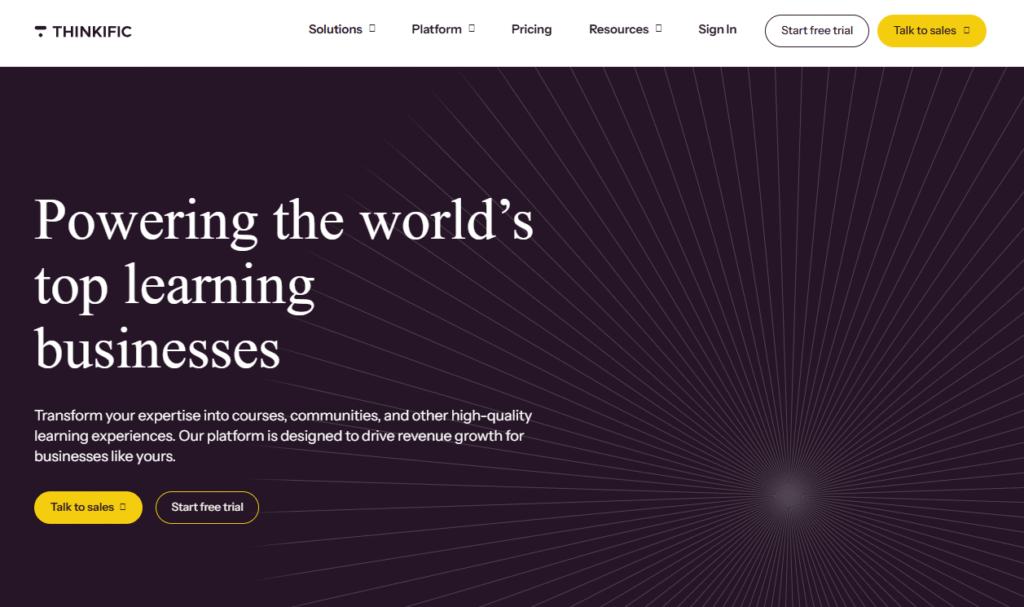
Thinkific is a top choice for course creators, entrepreneurs, and businesses that want to build professional learning academies. With over 50,000 creators across 190 countries, Thinkific is known for its flexibility, ease of use, and strong community support. Compared to Teachable, Thinkific gives users more control over design and customization, making it ideal for branding-focused creators.
Key Features
Drag-and-Drop Course Builder
Thinkific’s intuitive builder lets you design structured courses with videos, quizzes, downloads, and discussions without coding.
Customizable Website & Branding
Unlike many LMS tools, Thinkific allows full customization of your site, giving your courses a professional, branded appearance.
Memberships & Subscriptions
Creators can package courses into memberships or recurring subscription models, giving them predictable monthly revenue.
Community Features
Thinkific includes student discussion forums and community spaces to boost engagement and retention.
Integrations & App Store
With dozens of integrations (Zoom, Zapier, Mailchimp) and a dedicated app store, Thinkific can expand into a complete learning ecosystem.
Pros & Cons
| Pros | Cons |
| Strong customization options | Transaction fees on lower plan |
| Supports memberships & subscriptions | Limited marketing automation |
| Easy-to-use course builder | Advanced features cost more |
| Active creator community | Mobile app requires higher plans |
Pricing
- Basic Plan: $49/month
- Start Plan: $99/month
- Grow Plan: $199/month
- Expand Plan: $499/month
- Free plan with limited features available
Best For Creators Scaling Their Course Business
Thinkific is perfect for creators who want control over design and growth options.
- Educators — creating professional online schools
- Entrepreneurs — scaling course businesses with branding flexibility
- Membership communities — offering bundled content and subscriptions
- Training businesses — running client-facing academies
Thinkific is best if you want an LMS that balances customization, scalability, and ease of use. Pro tip: use Thinkific’s community feature to build a loyal student base that keeps coming back for additional courses.
How to Use Thinkific for Membership Programs
Bundle multiple courses into subscription tiers, offering exclusive community access and live events to keep members engaged long term.
Best Alternate: LearnWorlds
If you need advanced interactive video learning and white-label branding, LearnWorlds is a strong alternative to Thinkific.
13. Kajabi – “All-in-One Platform for Digital Entrepreneurs”
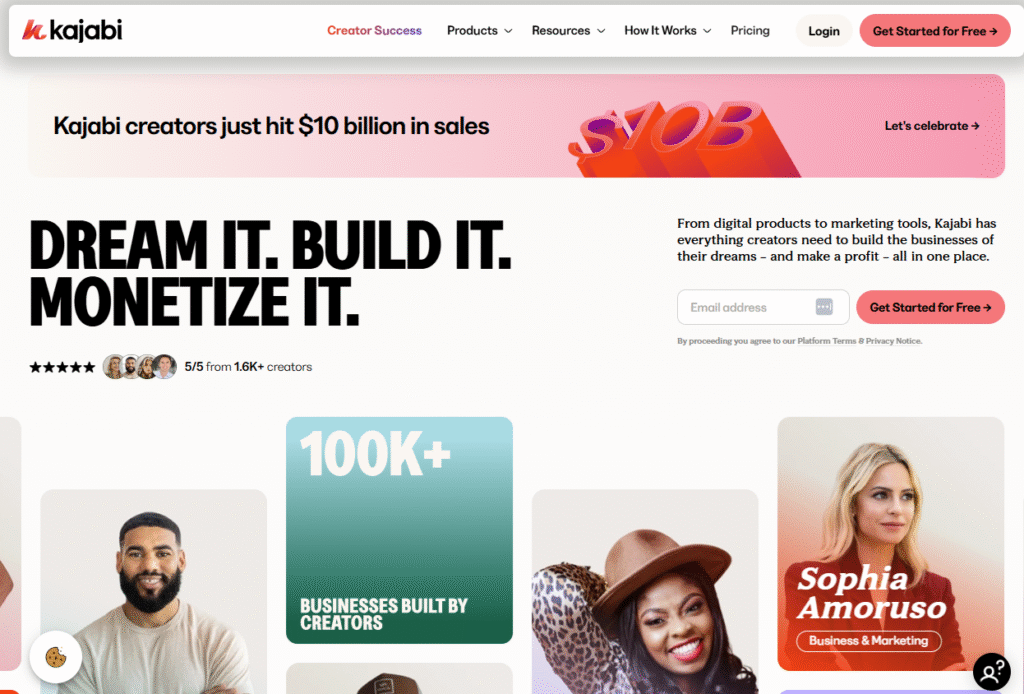
Kajabi is more than an LMS—it’s a complete business platform for entrepreneurs, coaches, and digital creators. With over $5 billion in sales processed through its platform, Kajabi is trusted by creators who want to combine courses, memberships, and marketing automation under one roof. Unlike Teachable or Thinkific, Kajabi eliminates the need for multiple third-party tools.
Key Features
All-in-One Business Suite
Kajabi includes website hosting, email marketing, sales funnels, and CRM—all alongside its LMS. This makes it a single solution for running a digital business.
Marketing Automation
Automated email sequences, upsells, and funnels allow creators to nurture students into long-term customers.
Memberships & Communities
In addition to courses, Kajabi supports memberships, coaching programs, and private communities for student engagement.
Mobile App
Kajabi’s mobile app gives learners access to courses and communities on the go, with push notifications for updates.
Payment & Monetization
Built-in payments allow recurring billing, one-time purchases, and product bundles, reducing reliance on third-party processors.
Pros & Cons
| Pros | Cons |
| Complete business platform | Higher price point |
| Built-in marketing tools | More complex for beginners |
| Supports courses, memberships, coaching | Limited design flexibility |
| Mobile app included | Overkill if only selling courses |
Pricing
- Basic Plan: $149/month
- Growth Plan: $199/month
- Pro Plan: $399/month
- Free trial available
Best For Digital Entrepreneurs Running a Full Online Business
Kajabi is best suited for creators who want to consolidate their course, website, and marketing into one system.
- Coaches & consultants — combining training with coaching packages
- Entrepreneurs — running digital-first businesses
- Membership communities — bundling content and community spaces
- Advanced creators — scaling with marketing automation
Kajabi is ideal if you want an LMS with built-in marketing and business tools. Pro tip: use Kajabi’s funnel builder to upsell coaching packages directly after a student completes a course.
How to Use Kajabi for Coaching Businesses
Set up a branded website, deliver recorded course modules, and bundle them with group coaching calls. Use Kajabi’s email automation to convert one-time students into ongoing coaching clients.
Best Alternate: Teachable
If you want a simpler, beginner-friendly course platform without marketing automation, Teachable is a more affordable alternative to Kajabi.
14. iSpring Learn – “Corporate LMS with SCORM Power”
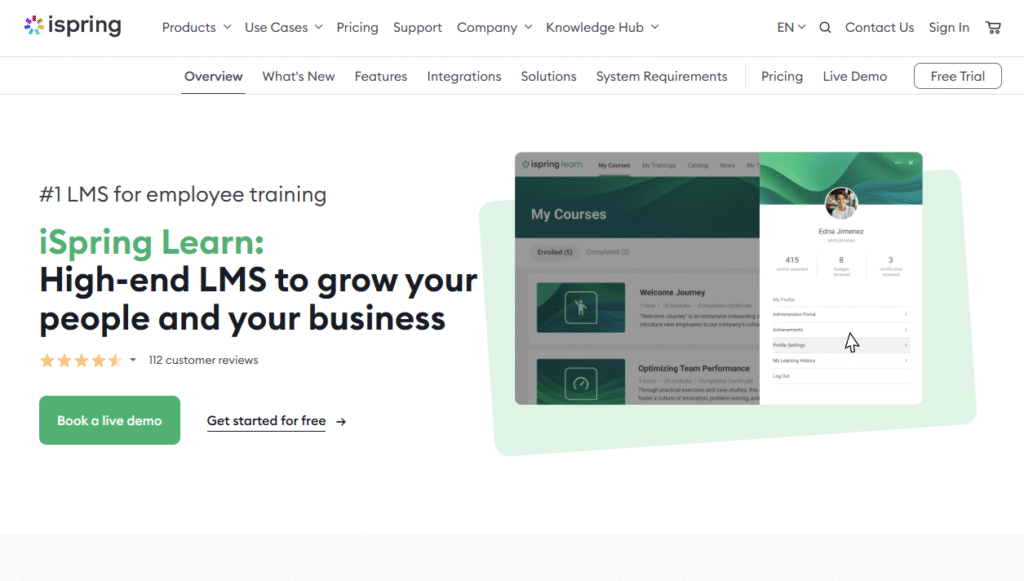
iSpring Learn is a corporate-focused LMS designed for businesses that prioritize compliance training, employee onboarding, and product knowledge. Trusted by companies like Microsoft, Dell, and SAP, it stands out for its SCORM compatibility, rapid course authoring tools, and ease of use. Unlike many LMS platforms, iSpring pairs seamlessly with iSpring Suite, a popular course authoring toolkit.
Key Features
SCORM & xAPI Compatibility
iSpring Learn fully supports SCORM and xAPI standards, making it easy to import or create interactive courses without losing tracking data.
Integration with iSpring Suite
Users can design engaging courses, quizzes, and simulations in iSpring Suite and deploy them instantly inside iSpring Learn.
Fast Onboarding & Training
The platform is built for corporate environments, letting HR managers assign courses quickly and track compliance in real time.
Mobile Learning
Employees can access training anytime via the iSpring Learn mobile app, with offline learning support for field workers.
Reporting & Analytics
Detailed reports cover completion rates, knowledge gaps, and compliance metrics, helping managers measure learning effectiveness.
Pros & Cons
| Pros | Cons |
| Strong SCORM & xAPI support | Less suitable for selling courses |
| Seamless integration with iSpring Suite | Limited design customization |
| Easy setup & intuitive UI | Fewer community-building features |
| Excellent for compliance training | Lacks large content marketplace |
Pricing
- Business Plan: Starts at $2.99/user/month
- Volume discounts available
- Free trial offered
Best For Corporate Training & Compliance Programs
iSpring Learn is perfect for organizations that need compliance-ready training with SCORM compatibility.
- HR managers — rolling out employee onboarding quickly
- Enterprises — requiring strict compliance tracking
- Product training teams — educating employees or customers on tools
- Field-based companies — supporting offline learning for staff
iSpring Learn is best if you want a fast, compliance-focused LMS that integrates with powerful authoring tools. Pro tip: use iSpring Suite simulations to train employees on customer scenarios or technical processes.
How to Use iSpring Learn for Compliance Training
Upload SCORM-compliant compliance courses, set automatic recertification reminders, and generate detailed reports for auditors with a few clicks.
Best Alternate: SAP Litmos
If you need broader enterprise integrations with Salesforce and global teams, SAP Litmos is a stronger alternative to iSpring Learn.
15. EdApp – “Microlearning for Mobile-First Teams”
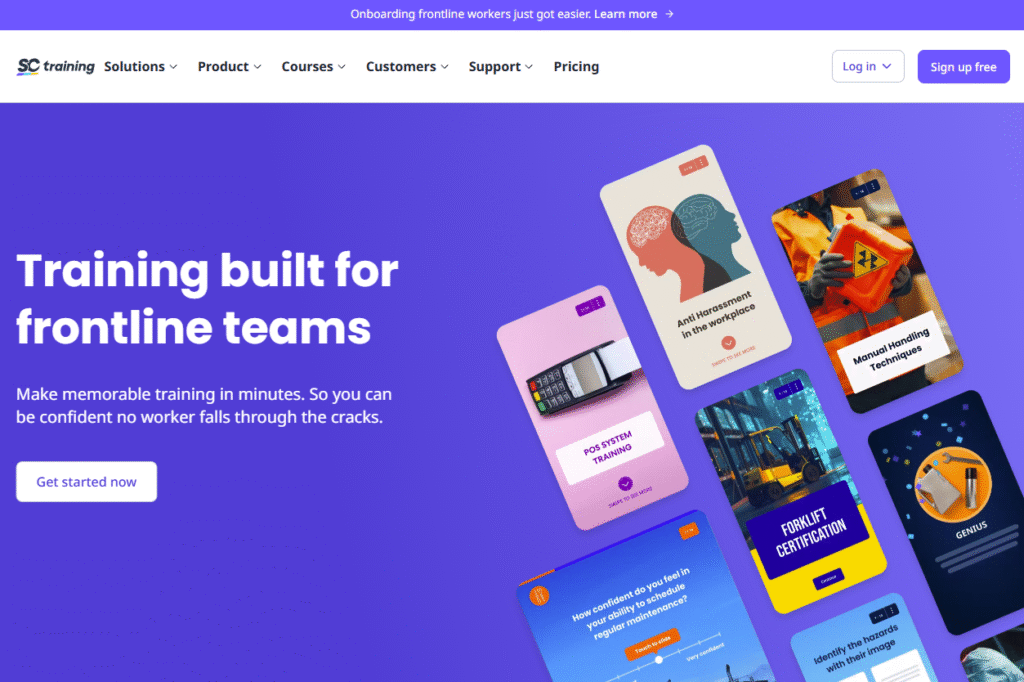
EdApp is a mobile-first LMS designed for companies that want to deliver training in short, engaging bursts. Used by Coca-Cola, Shell, and Audi, it focuses on microlearning, making it ideal for frontline employees, retail staff, and distributed teams. Unlike traditional LMS platforms, EdApp emphasizes bite-sized lessons, gamification, and mobile accessibility.
Key Features
Microlearning Lessons
Training is broken into 5–10 minute lessons that fit into employees’ workdays without disrupting productivity.
Gamification Elements
Leaderboards, points, and real-time challenges keep learners motivated and engaged.
Built-In Authoring Tool
Create interactive lessons with drag-and-drop features, including quizzes, flashcards, and surveys.
Mobile-First Learning
The EdApp mobile app lets employees learn anytime, with offline access for remote or on-the-go workers.
Ready-Made Course Library
Includes hundreds of free and paid courses on compliance, workplace safety, and soft skills.
Pros & Cons
| Pros | Cons |
| Perfect for microlearning | Not ideal for in-depth training |
| Strong gamification | Limited analytics compared to enterprise LMS |
| Free plan available | Lacks advanced customization |
| Easy-to-use authoring tool | Less suited for higher education |
Pricing
- Free Plan: Includes core features and unlimited users
- Paid Plans: Custom pricing for advanced features and support
- Free trial available
Best For Mobile-First & Frontline Teams
EdApp is ideal for organizations that need fast, engaging training on mobile devices.
- Retail companies — training staff on product updates
- Hospitality businesses — onboarding seasonal employees quickly
- Manufacturers — providing safety training on the factory floor
- Remote teams — accessing training anytime, anywhere
EdApp is the right fit if you want an LMS focused on microlearning and gamification. Pro tip: use EdApp’s spaced repetition feature to reinforce key knowledge over time and improve retention.
How to Use EdApp for Retail Training
Deliver bite-sized product knowledge courses before new product launches, ensuring frontline staff are confident in answering customer questions.
Best Alternate: TalentLMS
If you need a broader LMS with structured training and gamification, TalentLMS is a great alternative to EdApp.
16. Canvas – “Student-Centered Learning for Schools & Universities”
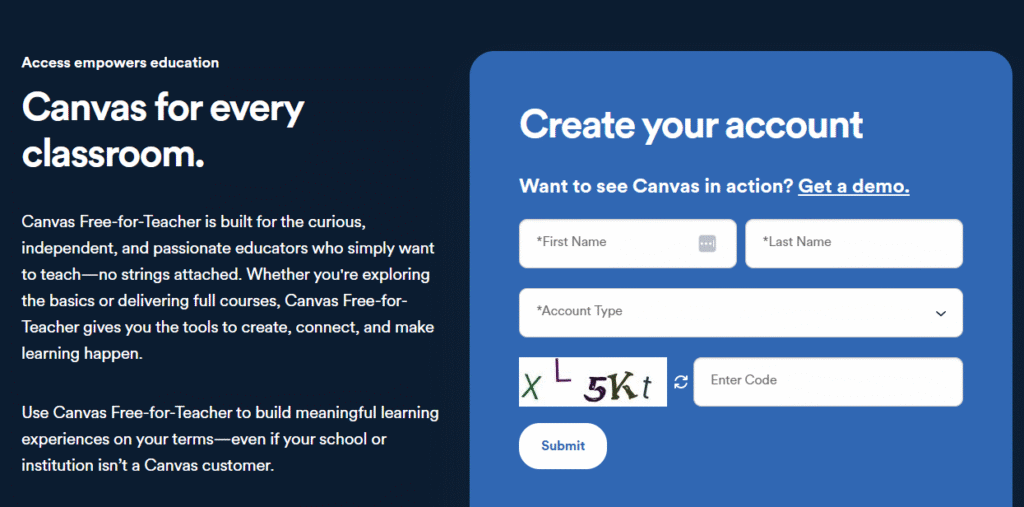
Canvas is a modern LMS designed for education. Adopted by institutions like Harvard, Stanford, and the University of Michigan, it is widely recognized for its user-friendly interface, cloud-based setup, and mobile-first design. Canvas is especially strong in higher education, where it supports blended learning, online programs, and large-scale student management.
Key Features
User-Friendly Interface
Canvas has one of the cleanest and most intuitive interfaces in the education LMS space, reducing the learning curve for both instructors and students.
Mobile App for Learners
The Canvas app allows students to view assignments, participate in discussions, and submit coursework on the go.
Blended Learning Support
Supports both in-person and online classes, making it ideal for universities with hybrid learning models.
Integrations & LTI Compatibility
Canvas integrates with Google Workspace, Microsoft Teams, Zoom, and thousands of LTI-compatible tools for seamless classroom management.
Analytics & Progress Tracking
Instructors can monitor student progress, assignment submissions, and overall performance to identify at-risk learners early.
Pros & Cons
| Pros | Cons |
| Intuitive, modern design | Higher cost than Moodle |
| Strong mobile support | Limited customization vs open-source LMS |
| Excellent for higher ed | Not tailored for corporate training |
| Wide range of integrations | Requires training for admin setup |
Pricing
- Custom Pricing: Based on institution size and needs
- Free trial available on request
Best For Colleges, Universities & Schools Using Hybrid Models
Canvas is built for academic institutions that value student-centered design and blended learning flexibility.
- Universities — managing large student populations
- Community colleges — offering hybrid learning environments
- K-12 schools — providing digital tools for teachers and students
- Online programs — scaling distance education courses
Canvas is a great choice for schools that want a modern, cloud-based LMS with excellent usability. Pro tip: use Canvas’s early-warning analytics to flag students falling behind and intervene before dropouts occur.
How to Use Canvas for Blended Learning
Combine in-person lectures with online quizzes, assignments, and discussion boards, giving students flexible ways to learn and engage.
Best Alternate: Moodle
If you want a free, open-source LMS with deeper customization options, Moodle is a solid alternative to Canvas.
17. DoMyLMS – “Simple, Affordable Training for Small Businesses”
DoMyLMS is a lightweight learning management system built for small to mid-sized businesses that want straightforward employee training without enterprise complexity. It’s best known for its easy setup, budget-friendly pricing, and user-friendly interface, making it a strong option for companies that don’t have dedicated L&D teams.
Key Features
Quick Setup
DoMyLMS can be deployed in hours, not weeks, making it ideal for small businesses that need fast implementation.
Custom Course Uploads
Admins can upload their own training content—videos, PDFs, SCORM packages—and organize them into simple learning paths.
Employee Progress Tracking
Managers can monitor course completions, quiz results, and overall learner performance through basic reporting dashboards.
Mobile-Friendly Platform
DoMyLMS works smoothly on both desktop and mobile devices, giving employees flexibility in how they learn.
Affordable Pricing
Compared to enterprise LMS platforms, DoMyLMS offers straightforward pricing without complicated contracts.
Pros & Cons
| Pros | Cons |
| Easy to set up | Lacks advanced analytics |
| Affordable pricing | Limited integrations |
| Good for SMBs | No marketplace content |
| Mobile-friendly | Not built for large enterprises |
Pricing
- Starter Plan: $50/month for up to 50 users
- Growth Plan: Custom pricing for more users
- Free trial available
Best For Small Businesses Needing Simple Training
DoMyLMS is best for organizations that want basic training tools at a low cost.
- Small businesses — onboarding new hires quickly
- Startups — needing lightweight compliance training
- Retail & hospitality — training seasonal staff fast
- Companies on a budget — avoiding expensive enterprise systems
DoMyLMS is the right fit if you want a straightforward, no-frills LMS that gets the job done. Pro tip: use DoMyLMS for creating short onboarding modules to cut down training time for new hires.
How to Use DoMyLMS for Employee Onboarding
Upload orientation videos, company policy documents, and quizzes so new employees can complete onboarding in their first week.
Best Alternate: TalentLMS
If you want a more feature-rich but still affordable LMS, TalentLMS is a strong upgrade option compared to DoMyLMS.
18. SkyPrep – “Employee Training Made Simple”
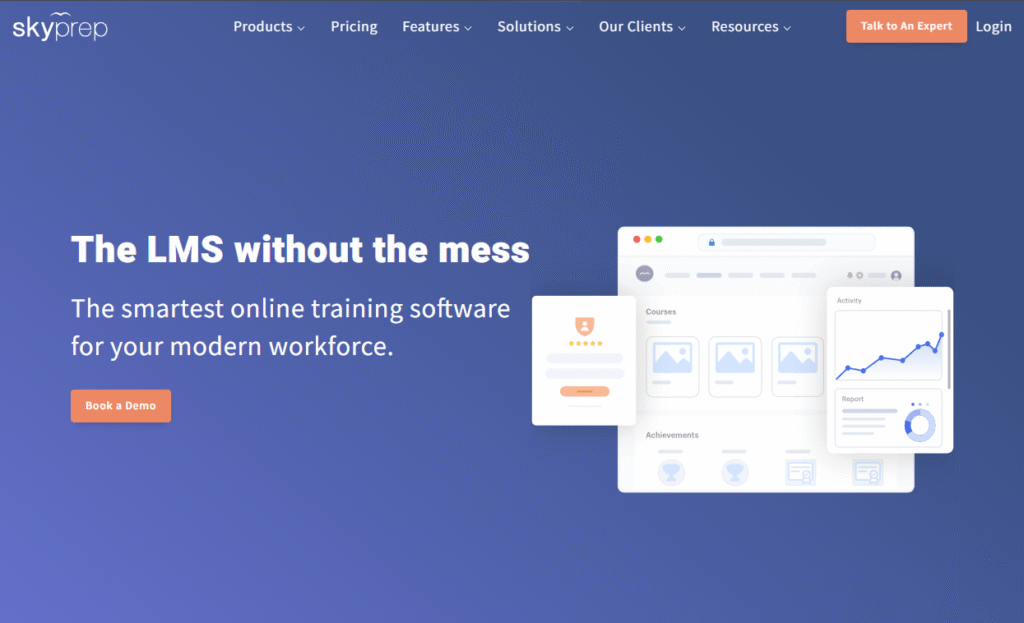
SkyPrep is a cloud-based LMS focused on delivering straightforward employee training for SMBs and mid-market companies. Trusted by organizations like Goodwill, eBay, and Sony, it balances ease of use with strong reporting tools, making it suitable for businesses that want to upskill teams without investing in overly complex platforms.
Key Features
Course Creation & Management
Upload SCORM courses, videos, documents, and quizzes. Courses can be bundled into learning paths for structured training.
Advanced Reporting
SkyPrep includes customizable reporting dashboards that track employee progress, quiz results, and compliance records.
Certification & Compliance Tools
Automated certifications and recertifications make it ideal for companies that need to meet industry regulations.
Integration Capabilities
SkyPrep integrates with tools like Zoom, PayPal, and Google Workspace to streamline training delivery.
Mobile Learning
The responsive design ensures training is accessible on any device, supporting flexible learning for remote teams.
Pros & Cons
| Pros | Cons |
| Easy to use for SMBs | Pricing higher than DoMyLMS |
| Strong compliance tools | Limited gamification |
| Good reporting options | Not designed for higher education |
| Reliable integrations | Fewer community features |
Pricing
- Starter Plan: $199/month (up to 100 users)
- Business Plan: Custom pricing for larger organizations
- Free trial offered
Best For SMBs Needing Employee Training & Compliance
SkyPrep is designed for businesses that want structured training without enterprise complexity.
- Small to mid-sized businesses — scaling employee training
- HR teams — tracking compliance and certifications
- Customer service departments — training staff on new systems
- Companies with remote staff — delivering mobile-friendly learning
SkyPrep is a solid choice for SMBs that want easy-to-manage training with compliance tracking. Pro tip: use SkyPrep’s certification tools to automate recertifications, saving HR teams hours of manual work.
How to Use SkyPrep for Compliance Programs
Create recurring certification courses with automatic renewal reminders to ensure employees remain compliant year-round.
Best Alternate: Absorb LMS
If you need more advanced analytics and eCommerce features, Absorb LMS is a strong alternative to SkyPrep.
19. LearnDash – “The LMS Built for WordPress”
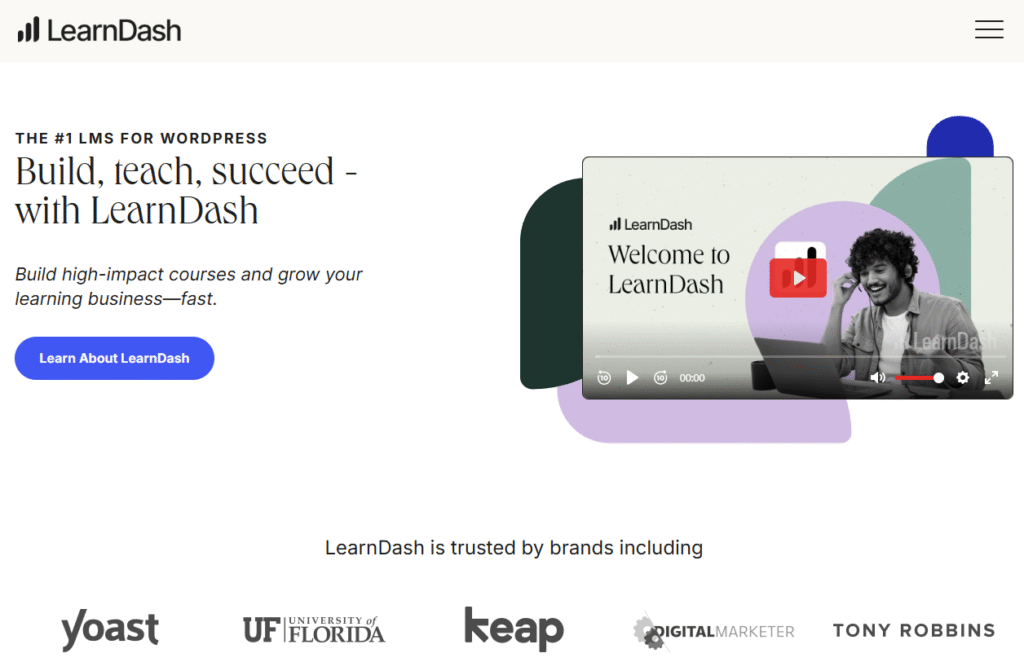
LearnDash is a WordPress plugin LMS that powers thousands of online courses worldwide. Used by Yoast Academy, Infusionsoft, and the University of Florida, it’s perfect for creators and businesses already running their websites on WordPress. Its biggest advantage is flexibility—you can customize it with plugins, themes, and integrations to build a fully branded online school.
Key Features
WordPress Integration
LearnDash plugs directly into WordPress, giving full control over course layout, branding, and user experience.
Advanced Course Builder
Drag-and-drop builder supports lessons, quizzes, assignments, and drip-feed scheduling, letting instructors structure content professionally.
Monetization Options
Supports one-time payments, subscriptions, memberships, and course bundles. You can also integrate with WooCommerce for advanced eCommerce.
Gamification & Engagement
Badges, certificates, and points encourage learners to complete courses. Discussion forums and groups increase engagement.
Third-Party Integrations
Integrates with Zapier, PayPal, Stripe, and marketing tools like Mailchimp and ConvertKit, making it easy to connect with existing systems.
Pros & Cons
| Pros | Cons |
| Full control via WordPress | Requires WordPress hosting |
| Strong monetization tools | Steeper learning curve for beginners |
| Advanced course features | Can get expensive with add-ons |
| Large ecosystem of plugins | Requires ongoing site maintenance |
Pricing
- Basic License: $199/year (1 site)
- Plus Package: $399/year (up to 10 sites)
- Pro Package: $799/year (up to 25 sites)
No free plan; 15-day refund policy available
Best For WordPress Users Wanting Full Control
LearnDash is best for creators and businesses that want a customizable LMS tightly integrated with WordPress.
- Course creators — already running WordPress websites
- Agencies — building branded academies for clients
- Universities — integrating courses into existing WordPress portals
- Entrepreneurs — monetizing training with advanced eCommerce
LearnDash is the right choice if you want a flexible, self-hosted LMS with advanced features. Pro tip: pair LearnDash with WooCommerce and MemberPress to create a full membership site with recurring revenue.
How to Use LearnDash for Membership Sites
Bundle courses into membership tiers, lock content behind subscriptions, and upsell advanced courses through WooCommerce integration.
Best Alternate: Thinkific
If you want a hosted LMS with easier setup and lower maintenance, Thinkific is a great alternative to LearnDash.
20. Tovuti LMS – “All-in-One Learning & Engagement Platform”
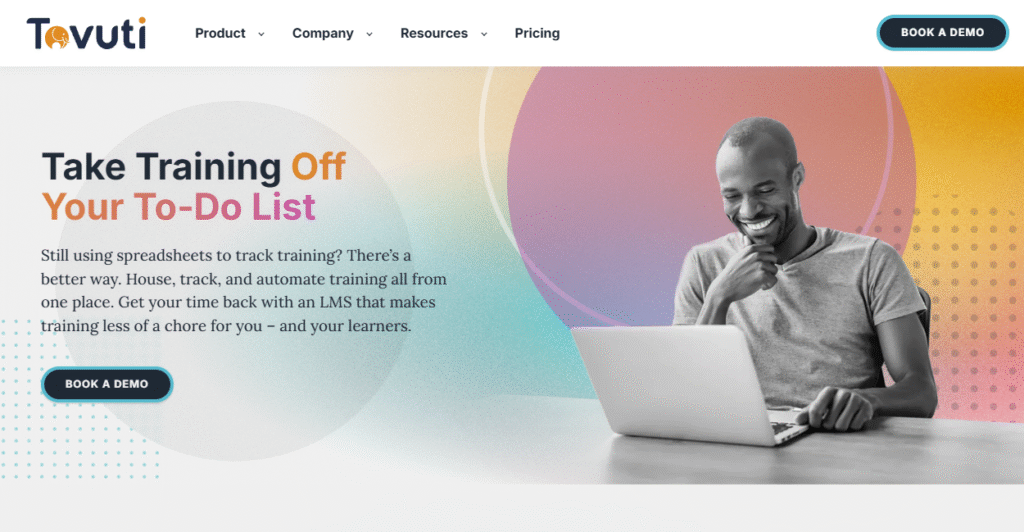
Tovuti LMS is a feature-packed cloud LMS designed for businesses, nonprofits, and government organizations. Known for its interactive learning tools and strong customization options, it goes beyond traditional LMS features by offering gamification, social learning, and content authoring in one platform. Tovuti is trusted by clients like Oracle, Mayo Clinic, and Sony.
Key Features
Interactive Learning Tools
Tovuti includes features like flashcards, memory games, and interactive video quizzes to keep learners engaged.
Built-In Authoring Suite
Create custom eLearning content directly in the platform without relying on third-party tools.
Social Learning & Communities
Learners can join groups, discussion forums, and leaderboards, turning training into a collaborative experience.
Virtual Classrooms & Events
Host live training sessions with integrated video conferencing and breakout room options.
Custom Branding & Portals
Organizations can fully customize portals, making Tovuti suitable for both internal and external training.
Pros & Cons
| Pros | Cons |
| Highly interactive tools | Higher starting price |
| All-in-one platform | Can feel overwhelming for SMBs |
| Strong social learning features | More complex setup required |
| Built-in content authoring | Not the cheapest option |
Pricing
- Starter Plan: $775/month (up to 50 users)
- Enterprise Plans: Custom pricing for larger organizations
- Free trial available
Best For Organizations Wanting Interactive Training
Tovuti is ideal for companies that want a single LMS with interactive learning and community features.
- Enterprises — needing branded training academies
- Healthcare & government agencies — requiring compliance plus engagement tools
- Nonprofits — running educational initiatives with communities
- Training businesses — offering client-facing courses with interactivity
Tovuti LMS is the right fit if you want an all-in-one LMS with interactivity and community features built in. Pro tip: use gamified quizzes and leaderboards to keep employees engaged during long compliance courses.
How to Use Tovuti LMS for Internal Training
Build role-specific training paths, add interactive modules, and use leaderboards to encourage friendly competition among teams.
Best Alternate: 360Learning
If your focus is more on peer-driven collaborative learning rather than built-in interactivity, 360Learning is a strong alternative to Tovuti.
Final Thoughts on the Best Learning Management Systems in 2025
Choosing the right Learning Management System (LMS) in 2025 comes down to your business size, training goals, and budget. Whether you’re a small business looking for simple onboarding with DoMyLMS, a university running large-scale education with Moodle or Canvas, or an enterprise needing compliance-ready tools like SAP Litmos and Cornerstone, there’s a platform here that fits your needs.
Investing in the right LMS not only saves time but also creates a scalable way to train employees, engage learners, and even generate new revenue streams from courses.
How Pearl Lemon Academy Can Support Your LMS Journey
At Pearl Lemon Academy, we understand that choosing an LMS is only half the battle. The real challenge is implementing it effectively to meet your organization’s training and growth goals.
Our team helps businesses:
- Select the best LMS for their industry and needs
- Design custom learning pathways for employees or clients
- Develop engaging training content that boosts retention
- Set up analytics and reporting to track progress and compliance
- Train internal teams to manage and scale learning systems confidently
Whether you’re a startup, university, or global enterprise, Pearl Lemon Academy ensures your LMS investment delivers real value. If you’re ready to take your training programs to the next level, schedule a consultation with us today.
FAQs
1. What is the best LMS for small businesses?
TalentLMS and DoMyLMS are great choices for SMBs due to their affordability and easy setup.
2. Which LMS is best for enterprises?
Docebo, Cornerstone, and SAP Litmos are strong enterprise options with compliance and scalability features.
3. Is Moodle really free?
Yes, Moodle is open-source and free to use, though hosting and maintenance costs apply.
4. Can I sell courses directly through an LMS?
Yes. Platforms like LearnWorlds, Teachable, Thinkific, and Kajabi include built-in eCommerce tools for selling courses.
5. What’s the difference between an LMS and an LXP?
An LMS delivers structured training, while a Learning Experience Platform (LXP) like 360Learning emphasizes collaboration and self-directed learning.
6. Do all LMS platforms support mobile learning?
Most modern LMS systems, including EdApp, Canvas, and TalentLMS, provide mobile apps for flexible learning.
7. Which LMS is best for compliance-heavy industries?
SAP Litmos, Cornerstone OnDemand, and iSpring Learn are designed with compliance tracking and certification management in mind.
8. Can I integrate an LMS with my HR system?
Yes, enterprise LMS platforms like Docebo, Absorb, and Cornerstone integrate with HR tools such as Workday and SAP SuccessFactors.
9. What’s the easiest LMS for beginners?
Teachable and Thinkific are very beginner-friendly and require little technical expertise.10. How do I choose the right LMS for my business?
Consider your training goals, number of users, compliance needs, budget, and whether you want to monetize courses.


